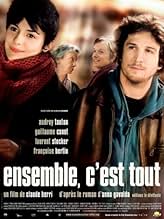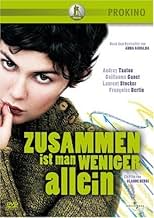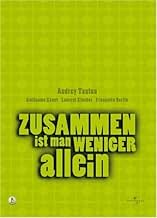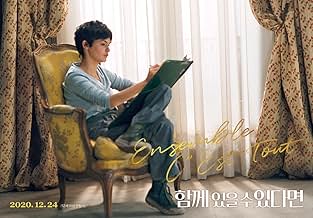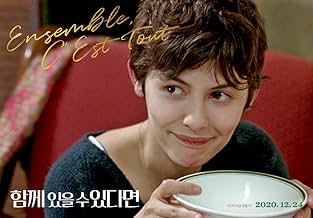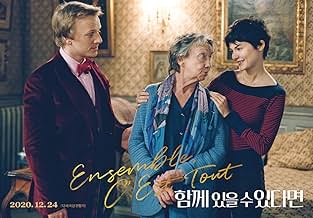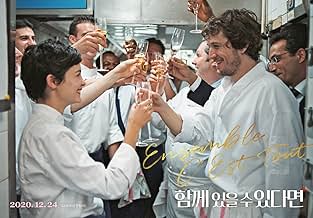VALUTAZIONE IMDb
6,7/10
12.789
LA TUA VALUTAZIONE
Quando Camille si ammala, è costretta a vivere con Philibert e Franck. Una commovente storia di trio.Quando Camille si ammala, è costretta a vivere con Philibert e Franck. Una commovente storia di trio.Quando Camille si ammala, è costretta a vivere con Philibert e Franck. Una commovente storia di trio.
- Regia
- Sceneggiatura
- Star
- Premi
- 3 vittorie e 5 candidature totali
Béatrice Michel
- Carine
- (as Beatrice Michel)
Hélène Surgère
- Yvonne
- (as Helene Surgere)
Danièle Lebrun
- Mère de Camille
- (as Daniele Lebrun)
Sandrine Mazéas
- Sandrine
- (as Sandrine Mazeas)
Recensioni in evidenza
I liked the film. Though it differs from the novel by Anna Gavalda. I imagined a bit another Franck, but Guillaume Canet is so charming, and I must admit that he perfectly fits his part. Audrey Tautou isn't the best Camille... but I'm used to her being the "prima ballerina" of the French cinema... I reckon that are Philibert (Laurent Stocker) and Franck (Guillaume Canet) who make the whole film worth watching. And of course I must admit Tautou's good acting. All the actors beautified the film. It's no use retelling the plot. It's not a detective story with millions of turns up. This film speaks about life. And you know, read the book first. That's my advice. The film isn't as good as its original. But nothing's perfect! And if you want to form your own opinion (not the director's one) about Camille, Franck, Philibert, Paulette...... both read and watch.
'Ensemble, c'est tout' (2007) is the last film that Claude Berri wrote (based on a novel by Anna Gavalda) and directed to the end. His filmography ends with another film ('Trésor'), which he was unable to finish and see released, the film being completed by another director. 'Ensemble, c'est tout' can therefore be considered as a beautiful end to his career, a 'feel-good' film, having at its center a love story as it happens with many of his successful films. The title, oddly enough, fits the story. It was strangely translated in the English distribution as 'Hunting and Gathering' (!).
The film has four main characters, and at the beginning of the story none of them seems too happy. Paulette, an old woman who lives alone in her house, surrounded by her beloved cats and parrots falls, fractures her hip and has to be hospitalized for surgery and a long recovery. Her grandson, Franck, the only one who takes care of her, is exhausted from his work as a chef in a restaurant and also takes care of his grandmother (and her cats). Franck lives in a huge apartment with Philibert, a young man from an aristocratic family, a rich boy, unhappy as well because he aspires to become a stand-up actor despite an obvious stutter. In the same Parisian building lives Camille, a pretty and modest girl, a talented portretist, who works hard as a cleaning woman for a living. The four loners will grow closer and turn their relationships into friendships and more than that.
The recipe for this kind of films can be found in the American comedies of the 40s and 50s of the last century. The role of young Camille is played by Audrey Tautou, an actress I adore, part of a series of roles of her that seem to be inspired by those played by the other Audrey - Hepburn - in American films. How is it that this formula, where the characters get better and better with little obstacles, and which seemed outdated even in the original films, works so well here? One of the secrets is, I think, the fact that the characters are believable and many of the situations described are part of real life experiences. Guillaume Canet and Françoise Bertin play their roles excellently, but next to the incomparable Tautou I would mention Laurent Stocker, an actor with a special comic talent in a delicious role. 'Ensemble, c'est tout' is an elegant farewell film that Claude Berri left us at the end of his career.
The film has four main characters, and at the beginning of the story none of them seems too happy. Paulette, an old woman who lives alone in her house, surrounded by her beloved cats and parrots falls, fractures her hip and has to be hospitalized for surgery and a long recovery. Her grandson, Franck, the only one who takes care of her, is exhausted from his work as a chef in a restaurant and also takes care of his grandmother (and her cats). Franck lives in a huge apartment with Philibert, a young man from an aristocratic family, a rich boy, unhappy as well because he aspires to become a stand-up actor despite an obvious stutter. In the same Parisian building lives Camille, a pretty and modest girl, a talented portretist, who works hard as a cleaning woman for a living. The four loners will grow closer and turn their relationships into friendships and more than that.
The recipe for this kind of films can be found in the American comedies of the 40s and 50s of the last century. The role of young Camille is played by Audrey Tautou, an actress I adore, part of a series of roles of her that seem to be inspired by those played by the other Audrey - Hepburn - in American films. How is it that this formula, where the characters get better and better with little obstacles, and which seemed outdated even in the original films, works so well here? One of the secrets is, I think, the fact that the characters are believable and many of the situations described are part of real life experiences. Guillaume Canet and Françoise Bertin play their roles excellently, but next to the incomparable Tautou I would mention Laurent Stocker, an actor with a special comic talent in a delicious role. 'Ensemble, c'est tout' is an elegant farewell film that Claude Berri left us at the end of his career.
It's Audrey Tautou, and ever since Amelie, I am of the opinion that Singaporeans have an affinity for the pint sized actress, and her box office draw here is fairly strong. Count me in as one of the fans who will lap up her cinematic outings, good or bad, so long as our heroine gets the opportunity to shine on screen.
Hunting and Gathering is based on a novel by Anna Gavalda, and tells the story of four individuals whose lives converge in an apartment. In this movie directed by Claude Berri, I thought that it was split into 3 acts, with story arcs focused on the challenges faced by each of the characters. Tautou stars as Camille Fauque, a near anorexic surface engineer who smokes a lot, guzzles alcohol, but eats very little. Living alone in a small attic of an apartment block, she meets Philibert (Laurent Stocker), a fellow neighbour who suffers from bouts of anxiety. Philibert's housemate Franck (Guillaume Canet) is a chef who lives hard and fast, whose only worry is the welfare of his grandmother Paulette (Francoise Bertin), a senior citizen who fears being tossed aside by kin, and makes life quite difficult for her caretakers.
The narrative is quite plain actually, with every conceivable development being very predictable. That means no quirky twists and turns for the sake of it, and it actually allows you to shift to lower gears to enjoy this outing. It's a story about having dreams, fulfilling them, and helping others to fulfill theirs too, through encouragement and support rendered. Having all four characters together under one roof, though brief it might be, did seem like an episode of Friends gone all French and all whacked with the age grouping, and proving correct the adage that two's a company and three's a crowd.
It did try to cover a lot of ground given that there are a number of characters here, but it did so at the expense of depth. The romance entanglements between characters did seem rather superficial, bland, trivial and predictable, while Philibert's quest to stem out his stammering through stage acting unfortunately had to take the backseat, and thus having his character fade away somewhat for the last act of the movie. The most meaningful and beautiful arc here belongs to Francoise Bertin's Paulette, as her tale of fear of abandonment rings through very honestly, and somehow, you'll start to wonder when you're of old age, whether you will have companions whom you can get along with, or be forgotten and tossed to some old folks' home to spend your twilight years in. I felt that it was superiorly poignant, without which there would be no emotional anchor for this movie.
Somehow, movies that feature food and classy restaurants (Ratatouille, Mostly Martha and No Reservations anyone?) of late that I've watched always have fallen into the clichéd ending. I'm unsure if it's an unwritten rule to have it done so, or if it's a formula that has proved to work every time. But in all earnestness, I thought it ended quite nicely with that happily ever after feel. In summary, definitely worth a watch for the eye candy cast, but it plays like a generic romantic / friendship tale that possesses potential that was hardly scratched.
Hunting and Gathering is based on a novel by Anna Gavalda, and tells the story of four individuals whose lives converge in an apartment. In this movie directed by Claude Berri, I thought that it was split into 3 acts, with story arcs focused on the challenges faced by each of the characters. Tautou stars as Camille Fauque, a near anorexic surface engineer who smokes a lot, guzzles alcohol, but eats very little. Living alone in a small attic of an apartment block, she meets Philibert (Laurent Stocker), a fellow neighbour who suffers from bouts of anxiety. Philibert's housemate Franck (Guillaume Canet) is a chef who lives hard and fast, whose only worry is the welfare of his grandmother Paulette (Francoise Bertin), a senior citizen who fears being tossed aside by kin, and makes life quite difficult for her caretakers.
The narrative is quite plain actually, with every conceivable development being very predictable. That means no quirky twists and turns for the sake of it, and it actually allows you to shift to lower gears to enjoy this outing. It's a story about having dreams, fulfilling them, and helping others to fulfill theirs too, through encouragement and support rendered. Having all four characters together under one roof, though brief it might be, did seem like an episode of Friends gone all French and all whacked with the age grouping, and proving correct the adage that two's a company and three's a crowd.
It did try to cover a lot of ground given that there are a number of characters here, but it did so at the expense of depth. The romance entanglements between characters did seem rather superficial, bland, trivial and predictable, while Philibert's quest to stem out his stammering through stage acting unfortunately had to take the backseat, and thus having his character fade away somewhat for the last act of the movie. The most meaningful and beautiful arc here belongs to Francoise Bertin's Paulette, as her tale of fear of abandonment rings through very honestly, and somehow, you'll start to wonder when you're of old age, whether you will have companions whom you can get along with, or be forgotten and tossed to some old folks' home to spend your twilight years in. I felt that it was superiorly poignant, without which there would be no emotional anchor for this movie.
Somehow, movies that feature food and classy restaurants (Ratatouille, Mostly Martha and No Reservations anyone?) of late that I've watched always have fallen into the clichéd ending. I'm unsure if it's an unwritten rule to have it done so, or if it's a formula that has proved to work every time. But in all earnestness, I thought it ended quite nicely with that happily ever after feel. In summary, definitely worth a watch for the eye candy cast, but it plays like a generic romantic / friendship tale that possesses potential that was hardly scratched.
In a nutshell, this film mainly reflects a love story between two ordinary people, who at first were both agonized by the realities they faced. There are many interwined little episodes that are also worth savoring. What is amazing about this film is that the depiction of several common people with their own life problems can emit such positivity as to encourage us to have a less bleak view of our own destiny.
I liked this film. The French formula for romantic comedy doesn't depend on the characters being rich, young and handsome, an opulent setting , and no old people (except for very minor characters). French directors find romance in the humbler areas of Paris as well as the flashier parts. Camille (Audrey Tautou), an art school dropout, works as a cleaner, or "surface engineer" as she likes to be called. She lives in a garret in the same old apartment building as Philibert (Laurent Stocker), who is young and good-looking, but is the French equivalent of a dim gentleman. Philibert sells postcards for a living. Notwithstanding a stutter, he aspires to a career on the stage. He shares his rather grand but dowdy apartment, his grandmother's former home, with the gruff Franck (Guillaume Canet), a womanizing chef. Franck is pre-occupied with looking after his elderly grandmother Paulette (Francoise Bertin), who is hospitalized after a fall. When Camille falls ill Philibert invites Camille to convalesce at his place. Soon she is striking sparks off grumpy old Franck.
Philibert isn't gay; it's just that his romantic interests lie elsewhere. It is Pauline who draws Franck and Camille together. The French title "Ensemble C'est Tout" ("Together, That's All") says it all, really. (I haven't a clue what this film has to do with hunting and gathering).
Audrey Tautou has just about got the market for sexy French waifs sewn up. I've seen her in several other films and her performances are similar. Guillaume Canet lets us see his gruff chef's soft side and Francoise Bertin also evokes sympathy for someone made tiresome by old age. The part of Philibert's love interest Aurelia is severely truncated (the result of putting a 600 page novel into 100 minutes of film). This also tends to sideline Philibert later in the film.
I very much liked Jean de Floriet and Manon des Sources, directed by Claude Berri 20 years ago (two other literary adaptations). He is a very conservative, straightforward director, but he can produce some very vivid work. One very touching scene here is when Philibert goes to a speech therapist to cure his stutter. The therapist, Phillipe van Eeckhout, is one in real life and treated Berri after a recent stroke damaged his speaking ability.
So, we have no glamorous stars (though Audrey Tautou is big in France) and no shimmering background. But it's a warm-hearted story with some real emotion and, dare I say it, a happy ending. And here's something for the nit-pickers. Franck would never have got to London from the Gare du Lyon (except via the connecting suburban RER line). Paris - London trains leave from the magnificent Gare du Nord. But who cares?
Philibert isn't gay; it's just that his romantic interests lie elsewhere. It is Pauline who draws Franck and Camille together. The French title "Ensemble C'est Tout" ("Together, That's All") says it all, really. (I haven't a clue what this film has to do with hunting and gathering).
Audrey Tautou has just about got the market for sexy French waifs sewn up. I've seen her in several other films and her performances are similar. Guillaume Canet lets us see his gruff chef's soft side and Francoise Bertin also evokes sympathy for someone made tiresome by old age. The part of Philibert's love interest Aurelia is severely truncated (the result of putting a 600 page novel into 100 minutes of film). This also tends to sideline Philibert later in the film.
I very much liked Jean de Floriet and Manon des Sources, directed by Claude Berri 20 years ago (two other literary adaptations). He is a very conservative, straightforward director, but he can produce some very vivid work. One very touching scene here is when Philibert goes to a speech therapist to cure his stutter. The therapist, Phillipe van Eeckhout, is one in real life and treated Berri after a recent stroke damaged his speaking ability.
So, we have no glamorous stars (though Audrey Tautou is big in France) and no shimmering background. But it's a warm-hearted story with some real emotion and, dare I say it, a happy ending. And here's something for the nit-pickers. Franck would never have got to London from the Gare du Lyon (except via the connecting suburban RER line). Paris - London trains leave from the magnificent Gare du Nord. But who cares?
Lo sapevi?
- QuizCharlotte Gainsbourg was originally cast as Camille.
- Versioni alternativeThere are two different versions, although the runtimes are the same: "1h 37m (97 min)" and "1h 37m (97 min) (European Film Market) (Germany)".
I più visti
Accedi per valutare e creare un elenco di titoli salvati per ottenere consigli personalizzati
- How long is Hunting and Gathering?Powered by Alexa
Dettagli
Botteghino
- Lordo in tutto il mondo
- 31.927.276 USD
- Tempo di esecuzione1 ora 37 minuti
- Colore
- Mix di suoni
- Proporzioni
- 1.85 : 1
Contribuisci a questa pagina
Suggerisci una modifica o aggiungi i contenuti mancanti

Divario superiore
By what name was Semplicemente insieme (2007) officially released in India in English?
Rispondi

